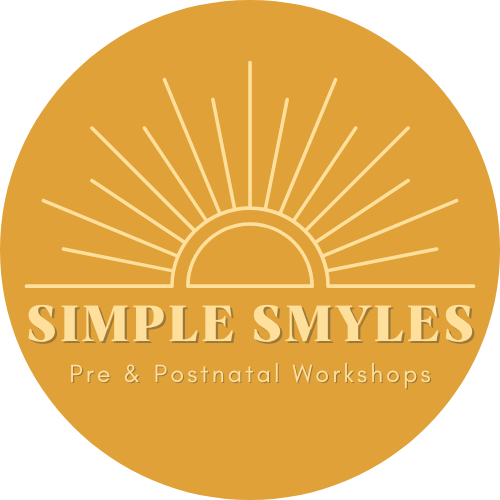When Choice Is the Support: Why Talking About Abortion Belongs in Every Parenting Space
At Simple Smyles, we talk about postpartum care, co-sleeping debates, EI delays, pelvic floors, mental health spirals, identity shifts — nothing is off-limits. And that’s why today, we need to talk about something that’s too often left out of “parenting” spaces:
Abortion.
Yep. We said it.
Because the truth is: parenting doesn’t start at birth. It starts with decision-making. It starts with asking yourself hard questions, looking at your life, your health, your body, your future, and saying:
“What is right for me right now?”
And sometimes, that answer is: not this pregnancy.
This isn’t political. It’s personal.
Abortion is healthcare.
Abortion is compassion.
Abortion is safety.
Abortion is parenting.
Let that last one land for a second.
Because sometimes, the most loving decision a person can make is not to continue a pregnancy. Whether it’s because of a medical diagnosis, financial reality, emotional overwhelm, relationship safety, trauma, timing — or simply because they don’t want to be pregnant.
That’s valid. That’s enough.
Why this conversation belongs here
There is a dangerous idea floating around that “pro-parenting” and “pro-choice” exist on opposite ends of some moral spectrum. That if you support new parents, you must oppose abortion.
We’re here to say: nope.
We support informed, empowered, and resourced families.
And that includes the choice not to become one right now.
We cannot offer “support” if that support only applies once a baby is born.
A Little History: Abortion in Canada
Abortion was decriminalized in Canada in 1988, when the Supreme Court struck down Section 251 of the Criminal Code in the landmark R. v. Morgentaler case. Before that, abortion was only permitted if a "Therapeutic Abortion Committee" approved it — a system that overwhelmingly failed marginalized folks.
In other words: abortion has only been legal, without restriction based on reason, for less than 40 years.
And even now, access is not equal across the country.
Provinces like PEI and New Brunswick have faced major criticism for limiting abortion services and funding.
Rural and Northern communities — particularly those with high Indigenous populations — often have to travel hundreds of kilometers for care.
1 in 6 Canadian hospitals do not offer abortion services.
Reproductive Injustice in Indigenous Communities
Let’s be crystal clear: Indigenous communities in Canada have long histories of forced sterilization, coerced abortions, and systemic control over reproductive autonomy — and this is not just history. It’s recent.
Between the 1960s and 1980s, thousands of Indigenous women were sterilized without consent — including teenage girls.
Reports as recent as 2018 confirmed that coerced sterilizations continued to take place in Saskatchewan, Alberta, and other provinces.
Indigenous women are overrepresented among those who face barriers to accessing safe, culturally appropriate abortion care.
This is why the conversation around abortion must be intersectional. For some, abortion access is about choice.
For others, it’s about control being taken away.
And for all of us, it should be about dignity.
The truth people don’t talk about:
Black, Brown, Indigenous, disabled, and low-income folks are far more likely to face barriers to both abortion and adequate prenatal/postnatal care.
When abortion access is stripped away, lives are put at risk — not hypothetically, but literally.
Adriana Smith’s story is a heartbreaking example: a woman whose wanted pregnancy turned into a medical emergency. Her care was delayed due to restrictive abortion laws. She died. Her family was stripped of decision-making. Her story is one of many.
Abortion isn’t always one thing.
It isn’t always chosen.
It isn’t always tragic.
It isn’t always something someone “moves on” from, or doesn’t.
It’s often complex.
It’s often a mix of grief, relief, clarity, heartbreak, and hope.
And in every case — the person deserves support, not silence.
If you’ve had an abortion, or love someone who has:
You deserve to be seen.
You deserve information, care, and zero shame.
You deserve providers who will listen, and communities who won’t flinch.
Let’s be the support.
We’re not here just to talk about choice.
We’re here to talk about justice.
About creating spaces where people of all backgrounds — especially those historically harmed by medical systems — can access safe, informed, and compassionate care.
Because parenting doesn’t begin with birth.
It begins with autonomy.
And autonomy begins with truth.
In True Simple Smyles Fashion…
We know we’re not the experts on everything — and we don’t pretend to be.
There are incredible organizations, clinics, and advocates who have been doing this work for decades, and we are so grateful to learn from them and uplift their voices. We believe support is a collective effort, and part of holding space for reproductive choice is knowing when to pass the mic.
We’ve also been connecting with the amazing folks at C.I.H.C ( Choice in Health Clinic ) here in Toronto — and are hoping to have a workshop/info session in the near future where they can lead discussions on;
Their abortion and reproductive health services
Navigating healthcare with trauma-informed support
Understanding your rights and options
Accessing care that centers YOU
If this speaks to you, stay tuned — we’re building bridges and spaces where you can be held, informed, and never alone in your choices.
Because that's what this is all about:
Not doing it alone.
Support & Resources:
Action Canada – National sexual health, abortion & advocacy support
Abortion Rights Coalition of Canada – Access equity and legal resources
Native Women’s Association of Canada – Reproductive justice & advocacy
Sexual Health Clinics by Province – Search by location
C.I.H.C (Choice in Health Clinic)Toronto – Instagram - https://choiceinhealth.ca/
Join our Community or follow us @simple.smyles for updates, support, and stories that honour every part of your journey — even the ones less talked about.

